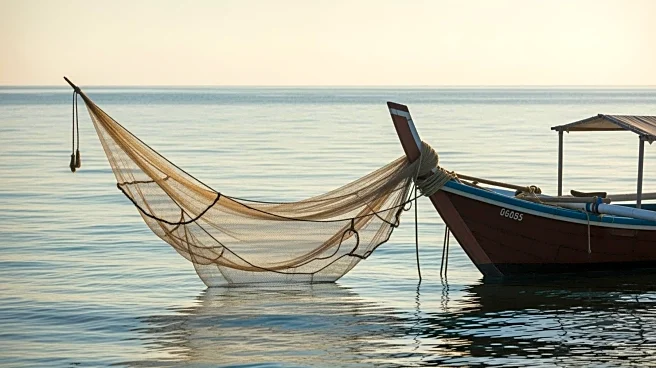What's Happening?
Morocco and Russia have renewed a bilateral agreement allowing Russian vessels to fish in Morocco's Atlantic waters. The deal was formalized in Moscow, with Moroccan Foreign Minister Nasser Bourita and Ilya
Shestakov, head of Russia's federal fisheries agency, signing the agreement. This four-year arrangement stipulates that Morocco will set an annual catch quota for Russian ships, ensuring regulated fishing activities within its territorial waters. The renewal of this agreement underscores ongoing cooperation between the two nations in the maritime sector.
Why It's Important?
The renewal of the fishing agreement between Morocco and Russia is significant for several reasons. Economically, it provides Russia with access to Morocco's rich Atlantic fishing grounds, potentially boosting its seafood industry. For Morocco, the deal represents a strategic partnership that could enhance its diplomatic ties with Russia, while also ensuring sustainable management of its marine resources through regulated quotas. This agreement may also influence regional maritime policies and international fishing rights discussions, as it highlights the importance of bilateral agreements in managing shared resources.
What's Next?
The implementation of the renewed fishing agreement will likely involve monitoring and enforcement of the annual catch quotas set by Morocco. Both countries may engage in further negotiations to address any arising issues related to fishing rights and environmental concerns. Additionally, this agreement could pave the way for expanded cooperation in other maritime sectors, such as joint ventures in fish processing or technology exchange in sustainable fishing practices.
Beyond the Headlines
The renewed fishing deal may have broader implications for international maritime diplomacy, as it reflects a growing trend of bilateral agreements in resource management. It could also impact regional geopolitical dynamics, as Morocco strengthens its ties with Russia amidst shifting global alliances. Furthermore, the agreement may prompt discussions on the environmental impact of fishing activities and the need for sustainable practices to preserve marine ecosystems.











